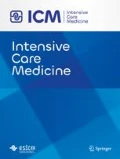Abstract
Objective
To determine the effect on the occurrence of urosepsis of a treatment with a short course of antibiotics and indwelling urethral catheter replacement in clinically asymptomatic intensive care unit (ICU) patients with a positive urine culture occurring at least 48 h after catheterization.
Methods
A prospective randomized clinical trial was conducted in the medico-surgical ICU of a tertiary care centre. Sixty patients hospitalized in the ICU with an indwelling urethral catheter for longer than 48 h developing an asymptomatic positive urine culture were randomized to receive either a 3-day course of antibiotics associated with the replacement of the indwelling urethral catheter 4 h after first antibiotic administration or no antibiotics, no catheter replacement (standard of care).
Results
Three patients in each group developed urosepsis (P = 0.1). There were no significant differences in duration of mechanical ventilation between the study group and the standard of care group (9 [4–20] days vs 5 [2–15] days, P = 0.2), in duration of urinary catheterization (22 [11–40] days vs 18 [14–33] days, P = 0.8), or in length of ICU stay (28 [13–46] vs 19 [15–34], P = 0.6). The recurrence of positive urine culture at days 7 and 15 was not affected by the randomization (P = 0.1). The profile of bacterial resistance was similar in the two groups.
Conclusions
Treating a positive urine culture in an asymptomatic patient with an indwelling urethral catheter does not reduce the occurrence of urosepsis in the medico-surgical ICU.
References
Leone M, Garnier F, Avidan M, Martin C (2004) Catheter-associated urinary tract infections in intensive care units. Microbes Infect 6:1026–1032
Nicolle LE, Bradley S, Colgan R, Rice JC, Schaeffer A, Hooton TM, Infectious Diseases Society of America, American Society of Nephrology, American Geriatric Society (2005) Infectious Diseases Society of America guidelines for the diagnosis and treatment of asymptomatic bacteriuria in adults. Clin Infect Dis 40:643–654
Rosser CJ, Bare RL, Meredith JW (1999) Urinary tract infections in the critically ill patient with a urinary catheter. Am J Surg 177:287–290
Leone M, Garnier F, Antonini F, Bimar MC, Albanese J, Martin C (2003) Comparison of effectiveness of two urinary drainage systems in intensive care unit: a prospective, randomized clinical trial. Intensive Care Med 29:551–554.
Leone M, Garnier F, Dubuc M, Bimar MC, Martin C (2001) Prevention of nosocomial urinary tract infection in ICU patients: comparison of effectiveness of two urinary drainage systems. Chest 120:220–224
Le Gall JR, Lemeshow S, Saulnier F (1993) A new Simplified Acute Physiology Score (SAPS II) based on a European/North American multicenter study. JAMA 270:2957–2963
Garner JS, Jarvis WR, Emori TG, Horan TC, Hughes JM (1988) CDC definitions for nosocomial infections, 1988. Am J Infect Control 16:128–140
Levy MM, Fink MP, Marshall JC, Abraham E, Angus D, Cook D, Cohen J, Opal SM, Vincent JL, Ramsay G (2003) 2001 SCCM/ESICM/ACCP/ATS/SIS International Sepsis Definitions Conference. Crit Care Med 31:1250–1256
Abrutyn E, Mossey J, Berlin JA, Boscia J, Levison M, Pitsakis P, Kaye D (1994) Does asymptomatic bacteriuria predict mortality and does antimicrobial treatment reduce mortality in elderly ambulatory women? Ann Intern Med 120:827–833
Harding GK, Zhanel GG, Nicolle LE, Cheang M, Manitoba Diabetes Urinary Tract Infection Study Group (2002) Antimicrobial treatment in diabetic women with asymptomatic bacteriuria. N Engl J Med 347:1576–1583
Harding GK, Nicolle LE, Ronald AR, Preiksaitis JK, Forward KR, Low DE, Cheang M (1991) How long should catheter-acquired urinary tract infection in women be treated? A randomized controlled study. Ann Intern Med 114:713–719
Rutschmann OT, Zwahlen A (1995) Use of norfloxacin for prevention of symptomatic urinary tract infection in chronically catheterized patients. Eur J Clin Microbiol Infect Dis 14:441–444
Author information
Authors and Affiliations
Corresponding author
Additional information
Conflict of interest: none
Financial support: none
Electronic supplementary material
Rights and permissions
About this article
Cite this article
Leone, M., Perrin, AS., Granier, I. et al. A randomized trial of catheter change and short course of antibiotics for asymptomatic bacteriuria in catheterized ICU patients. Intensive Care Med 33, 726–729 (2007). https://doi.org/10.1007/s00134-007-0534-1
Received:
Accepted:
Published:
Issue Date:
DOI: https://doi.org/10.1007/s00134-007-0534-1

